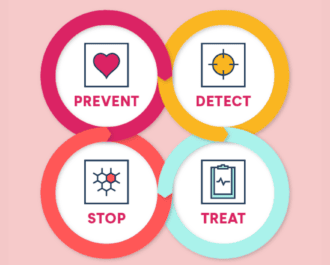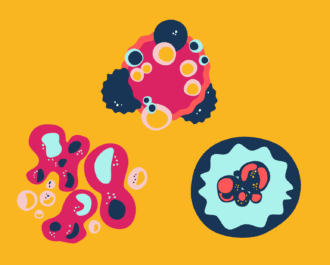
CAR T therapy is a new form of immunotherapy that uses genetically engineered T-cells (a type of immune cell) to kill cancer cells. Specifically, the patient’s own T-cells are modified by adding an anti-cancer molecule (called a chimeric antigen receptor or CAR) on their surface. These modified cells are then injected back into the patient, where they actively target and destroy cancer cells.
Whilst very effective in blood cancers, CAR T therapy has been less successful for solid tumours, such as breast cancer. This is partly due to the CAR T cells not functioning optimally in solid tumours leading to a less effective anti-cancer response. As such, researchers are working to discover new ways to improve the efficacy of this promising treatment for solid cancers.
A recent study, led by NBCF-funded researchers Dr Clare Slaney (Peter MacCallum Cancer Centre) and Prof Riccardo Dolcetti (the Diamantina Institute), has investigated whether a newly developed vaccination-based approach can improve CAR T treatment efficacy in breast cancer. The vaccine “primes” the body’s immune system, so that the CAR T cells can function more effectively. Using a breast cancer mouse model, the study found that this approach resulted in greater inhibition of tumour growth compared to treatment with either the vaccine or CAR T cells alone.
Dr Slaney explained that the results of the study were even more promising than anticipated.
“Remarkably, the tumours in some mice (treated with both the vaccine and CAR T cells) regressed completely, leading to long-term survival,” she said.
“Moreover, these mice remained tumour-free when challenged with a second injection of breast cancer cells, suggesting that the combination vaccine/CAR T treatment generated anti-cancer memory to prevent tumour relapse.”
Further work will now investigate this combination treatment in preclinical models, in preparation for potential clinical trials in the future. Although additional scientific and clinical study is needed, the research findings in this preclinical study suggest that anti-cancer vaccine treatment is a potential future avenue to improve CAR T treatment efficacy in breast cancer, which may help improve breast cancer patient outcomes.
The study was published in the journal Clinical & Translational Immunology. NBCF is proud to contribute to the funding of this project.
More News Articles
View all News


